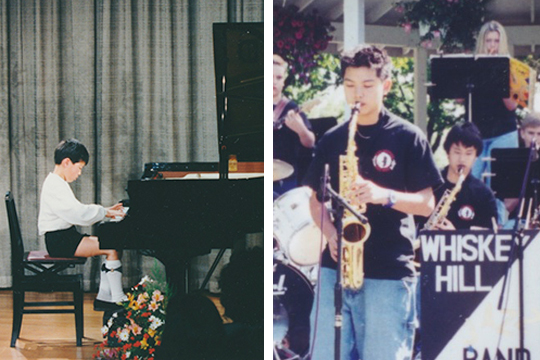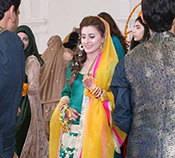Entertainment Brings the World Together.
(Part 1)
Yuki Kondo / Social Entrepreneur
Music made me who I am.
Music has been a source of great power for Yuki Kondo. He played the piano during early childhood, the saxophone in junior high school, and later the drums, with great passion, in senior high school. Music, he believes, creates connections that solve various problems in society by transcending differences in culture and race. “Life is Music” is his motto. We asked Yuki to describe what music means to him.
Music helped me overcome cultural and racial differences in another country.
The first musical instrument I ever touched was the piano in our home. I started taking classical piano lessons while in my first year at elementary school and continued after my family moved to the United States three years later for my father’s work. We lived in a small rural town in Oregon on the West Coast. This was the 1990s, when there were very few Japanese people in the area, and my classmates at school sometimes teased me or shunned me for being different. Only later, when I took up the saxophone in junior high school, did the people around me see me in a new light.
Jazz, with its penchant for ad-libbing, for straying from the score, enchanted me completely. Immersing myself in the jazz saxophone, I was soon given the important role of soloist in a school jazz band. I started winning Best Soloist awards at jazz festivals, which built up my reputation as “the guy who plays the saxophone really well.” Popular kids on the school bus invited me to join them: “Hey Yuki, come and sit over here!” I felt that music brought me closer to the people around me, which nurtured my confidence and affirmed my existence.

My preference for fusing musical genres parallels my feeling of being treated as an outsider.
At the time I wanted to play the saxophone professionally, but I moved to a school in New York where there were no opportunities to devote myself to the instrument. Instead, I turned my attention to the next best thing—the school’s rock band. Suddenly, I was engrossed in various rock genres with my drums, an instrument I’d been drawn to earlier. Looking back at my musical journey, on my transition from classical to jazz to rock, I see parallels between my preference for fusing different musical genres and my earlier life where I felt a sense of being an outsider. When my classmates singled me out as ‘that Japanese kid,” I felt I was reduced to one category because of the differences. I developed the habit of seeing the good in everything and capitalizing on the goodness I saw.
After graduating from school in New York, I returned to Japan to study environmental issues at Keio University’s Shonan Fujisawa Campus. I had picked up a strong interest in the environment from my nature-steeped existence in Oregon, a state made up of around 80 percent forest. When discussing the environment with university friends back in Japan, I was perplexed by how they shrugged things off with a “not my problem” mindset.
A turning point came for me when older students and I hosted a music festival focused on environmental themes on Tanegashima. We were confident that a fun festival with music would make people more receptive to the seriousness of the problems facing the environment. A display booth we set up inside the venue explained how rubbish drifting ashore from Tokyo and other cities was harming the local ecosystem of Tanegashima.

Music and entertainment unite people against environmental problems.
My Eureka moment came when I noticed a mother in the audience with her children in tow. I saw that she was showing her children a display of environmental fervor to encourage them to respect the earth as they lived their lives. Entertainment, I came to see, had the power to shake people out of their indifference—“not my problem” thinking. Through entertainment, you can easily communicate about various problems without using complicated language. The experiences people have when they are young have deep impacts on how their personalities develop. I grew convinced, on that day, that by approaching children I could improve their futures.
Not long afterwards I saw “Slum Dog Millionaire,” a movie showing the effects of poverty and human trafficking on children living in the slums of India. Here, too, it was the entertainment medium of film that made these social issues relevant for me.
Social issues and environmental problems have something in common: the moment you think something is “not my problem,” it becomes someone else’s problem. Yet entertainment mediums such as music, photography, and film have a hidden power to make social issues relevant, and in doing so, change the world. With that realization, I decided to join a large Tokyo record company to realize my dream of solving social problems through the power of entertainment.
- Yuki Kondo / Social Entrepreneur
- CEO, WORLD FESTIVAL Inc. On a mission to rid the world of "not my problem" thinking, Yuki uses entertainment mediums such as music and film to solve social problems. He is also involved with international education and exchange initiatives. In 2017, he started a music label to take up the challenge of uncovering gems of talent around the world.
Interview Date:



